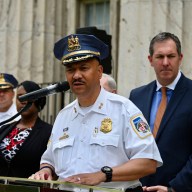 Sri Lankan soldiers in ceremonial uniform march at a memorial during National War Hero’s Day. Sri Lanka is rapidly becoming a tourism hot spot.
Sri Lankan soldiers in ceremonial uniform march at a memorial during National War Hero’s Day. Sri Lanka is rapidly becoming a tourism hot spot.
Credit: Getty Images
Andrew Drury’s awakening took place in a Congolese banana plantation as he ran for his life from a knife-wielding farmer. The British builder had wandered off from a tour of Uganda with his cousin Nigel Green, and unwittingly crossed a border into a war-torn nation.
“The chase went for a long time and the stress and danger made us realize there was more to the world than travel tours,” he told Metro. “Coming back from there we knew we wanted to do it more.”
In the following 22 years, Drury and his cousin have explored many of the world’s most dangerous conflict areas: Iraq, Afghanistan, Chechnya, Mogadishu, Burma. They have been under fire, captured and on the sharp end of a Taliban surge.
But Drury, 47, believes he is now “addicted” to such trips, although it is for the “living history” as much as the danger. Every night is spent searching the internet for opportunities to visit new danger zones through his global network of contacts. “The only time we really feel at one is on these trips. This is our idea of a good time. I’m in a job I don’t want to do and this takes me away.”
He is not alone. The adventure tourism sector, encompassing everything from climbing Mount Everest to picnicking on a Syrian battlefield, is growing by 17% each year and is worth $89 billion. Current conflict areas such as Afghanistan and Libya are becoming popular options.
“We have more interest in coming to Libya from European countries since the [Libyan civil] war, particularly France and Germany,” said Lars Tisell of the Libya-based Sherwes Travel. “The clan-fighting makes security difficult but we can still help people to come in.”
The sector’s rapid growth has led to more lurid packages. The US-based War Zone Tours boasts of “unrivalled brutality” in trips guided by ex-military personnel. Tours of terror attack sites in Northern Ireland have been criticized as exploitative by local people.
But being a “moral arbiter” is irrelevant, suggests Dr. John Lennon, author of ‘Dark Tourism’, and professor of tourism at Glasgow Caledonian University: “Fascination with death and disaster has always been part of human nature – we know that people watched the Battle of Waterloo from their carriages as a spectator sport.”
Lennon believes that deliberately pursuing danger is a more recent “micro-niche”. And the risk is real.
“If people don’t educate themselves they can put themselves in situations of deadly threat,” says Robin Ingle, CEO of Ingle International, which underwrites insurance for extreme tour companies such as ComeBackAlive.com. Ingle recalls one under-prepared tourist “sending a note that she was stuck at a UN mission in Congo, while UN staff were being killed in the area.”
Drury has had better luck so far, and has been welcomed by local people: “They generally don’t understand why we were there, but they wanted to tell their stories and they think tourism brings peace.” He has made close friends in the countries he visits: “The Chechens are incredible, I’ve been to Peshawar [in Afghanistan] three times just for the people.”
The trips have put strain on Drury’s family and almost killed him, but he would not have it any other way. “Yes I could get hurt and I wouldn’t recommend it to my children, but I want to go away again, now,” he said. “The storage freezer in Libya where Gaddafi’s body was put on display is my number one goal.”
Extreme travel agent. Pursuit of knowledge is main purpose of visit
Lifelong adventurer and co-founder of the Untamed Borders company James Willcox arranges trips to hotspots for a living, including Andrew Drury’s recent voyage to Somalia – the first commercial trip there in 20 years.
“We choose locations very carefully, and stay with locals in parts with no Western involvement,” he explained when asked about the difficulty of ensuring safety for his clients. “But we avoid having armed escorts – that makes it much more dangerous.”
Willcox believes that while people make these trips for many reasons, it is rarely voyeurism. “We don’t get people who just want a picture next to a burned-out tank,” he said. “In most cases they want to have an authentic experience and develop their understanding of a place that has been off-limits, and the dangerous places are always more interesting.”
“Thousands of people are now having a chance to visit places they have only seen on TV – and they are having experiences that are very different from the negative image.”
‘Alternative’ holiday hotspots worldwide
•Sri Lanka. High-end hotels on recent massacre sites have caused controversy, as has the skewed interpretation of history.
•Soham. British village was home to two murdered schoolgirls, and pleads with visitors to stay away.
•Cambodia Killing Fields. Luxury hotels and magic mushrooms are just part of the site experience.
•Swat Valley. Recently the Taliban stronghold has become a popular ski destination.
• Shankill Road. Site of one of Northern Ireland’s deadliest bombings and remains a flashpoint.
Tips: How to make it back home alive from your conflict zone vacation
1. Read your travel insurance policy to make sure you will be covered for danger zones, war, or terrorist acts. If not, you’ll need special risk insurance.
2. Research where you are going: Has there been any civil unrest or major criminal activity? How are the medical facilities? Do you need vaccinations before you go?
3. Don’t be conspicuous about your wealth or act like a tacky tourist. Bear in mind that enormous maps, expensive cameras, and brand name clothes can make you a target of theft or kidnapping.
4. Follow the laws and customs of the country you are visiting – a small faux-pas could land you in jail (or worse!).
5. Stick to populated areas and avoid using unregulated transportation. Try sticking to official buses that use toll roads and call for taxis in advance.
“Realizing no place is safe reduces fear” — Q&A with Jim McMurchy, 56, tourist from Brisbane, Australia
McMurchy has made numerous trips to conflict zones such as Afghanistan and Pakistan.
Metro: How did you get started?
McMurphy: It was from seeing a travel guide to Afghanistan in a bookshop. I hadn’t realized you could go there. I saw there were contact details for a tour operator, and through that I arranged to trip with two other people to Mazar-e-Sharif.
What reaction did you get from the locals?
People were incredibly friendly. I never felt animosity, although in the countryside villages they thought I was from Mars. Sometimes crowds would gather but it was mainly curiosity and amusement, although I wouldn’t do it without a guide.
When were you in the most danger?
There were spooky incidents, mainly in Kabul. My first trip I was in a restaurant when militants took over the building next door. I was hearing explosions but luckily I’m a bit deaf. In Pakistan, the US consulate was bombed when I was heading there.
Why were you not scared?
I’m not blasé but s**t happens everywhere. After the London bombing and Barcelona you realize nowhere is safe. That reduces the fear factor. And I’m fascinated by politics and wanted a less shallow view than I get from news reports.
What do you feel you’ve gained from the experiences?
It was fascinating to able to debunk a few myths. Politicians say feel-good lines about how these countries are improving but I could see for myself that infrastructure in Afghanistan has gone backwards. And it touched me to see the kids going to school and people trying to live normally in that situation. I won’t do much more of this travel but I saw what I wanted and I’m happy I did it.
















